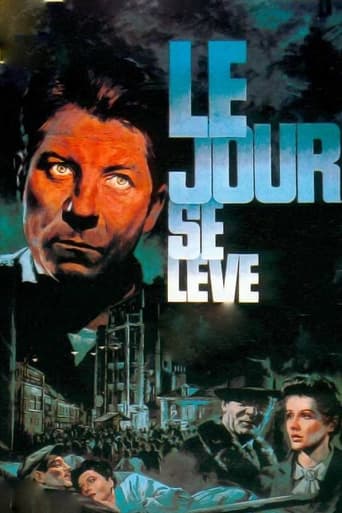Scott44
***Interesting commentary from Varlaam ("A tragedy of everyday proportions", Varlaam from Toronto, Canada, 3 February 1999), who uses actor math to describe Jean Gabin. Also, writers_reign from London ("Twilight At Dawn", writers_reign from London, England, 8 December 2003) adds context for the principal participants. Finally, nowlang ("A French Masterpiece about the Tragedy of a Simple Man's Life", nowlang (
[email protected]) from Small Town, New England, USA, 12 September 2006) adds interesting insight.***"Le jour se lève (Daybreak; 1939, Marcel Carné, France) is another superlative film from Carné. A common laborer is known to have killed a man, and is holed-up awaiting his fate. With the arrival of the Second World War looming, the participants involved in this project still manage to leave behind a story filled with understanding about the human condition.The film is very brave, as it is not hard to argue that "Daybreak" is a veiled protest against the increasingly repressive government. (The Vichy regime, which collaborated with the Nazis, took over a year after this film's release.) In the film's opening, a title card informs us that a murder has been committed and we will see what caused the murderer to act. The message has little purpose but to create the idea of a government proclamation announcing that someone is an enemy of the state. Who threatens the state the most? The French police exacerbate tensions whenever possible. They have François (Jean Gabin) trapped in his third-story apartment. Without a word of dialog, they begin shooting at François. Later, they deny a potentially crisis- ending conversation between François and several of his coworkers. When the laborers in the street begin to show signs of support for François, the police crush the public expression with violence against the helpless crowd. By starting with the title card that clarifies the government's official position and then presenting a story that encourages sympathy for the public enemy, "Daybreak" makes the statement that the present French government is getting out of control.Some viewers have an issue with the central cheat in the story, namely that François completely fails to recognize he has a legitimate case to make to an impartial jury. This is explained in part by the Fascistic police, which offer no sign they intend for him to receive a fair trial. There also seems to be relevance in the deceased having been an animal trainer. His ex-girlfriend and show partner Clara (Arletty) will describe some of Valentine's cruelty to his dogs by mentioning a specific example. So, perhaps François does not take steps to improve his situation because he is identified with the unfortunate puppies who can never escape Valentine's sadism. When weary François hysterically communicates with the crowd below, he might be offering some of the despair of show animals being cruelly trained. (An example of how Valentine torments François is by repeatedly calling him "simple." BTW, "Daybreak" sure has a lot more awareness about the plight of animals than does the "Wizard of Oz," also made in 1939.)It is a trademark of the collaboration between Carné (direction) and Jacques Prévert's (dialog) that a sense of balance is felt with the entire cast. Even the characters with brief moments on screen are perfectly realized. Jean Gabin is excellent in the lead role. He's one of my all-time favorite actors. If you mixed Spencer Tracy's looks with Humphrey Bogart's grit, sprinkling in Robert Mitchum's indifference, while supplying the result with a vast quantity of cigarettes, you might produce an actor similar. Gabin excels at portraying primitives, and is as convincing as a criminal as he is endearing. Gabin is a perfect choice for this despairing role of a laborer who grew up in an orphanage and now endures soul-crushing work to get by."Daybreak" is useful in understanding how Arletty was a successful leading lady despite being in her 40s. As an actress, she brings mystery and cleverness to her roles. While Arletty/Clara is an attractive woman, it is obvious that the younger, sensual Françoise, is intended to be the head-turner. Still, Arletty's Clara is a lot more streetwise than Françoise. Clara does not fall to pieces when situations get tough. Arletty appears to have been successful as a romantic lead during this turbulent era because she seems to offer the French male a partner that can hold up under duress.The sexuality is very advanced for 1939. There are four main characters and each has partnered with two others of the group. The scene where François joins Françoise on her bed is risqué. Françoise is also "ruined" when it is revealed her relationship with Valentine is not platonic. One can imagine the government censors having many internal conversations about just the sexual behavior on display. (I was a little annoyed in the naming similarity between François and Françoise. However, maybe this is to emphasize the similar states of mind the pair have at the finish.)If you are a cinema buff you won't want to miss this.

